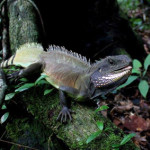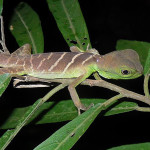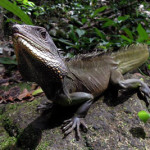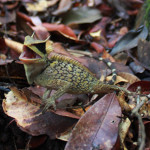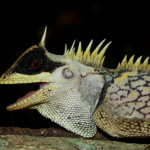Asian Leaf Turtle (Cyclemis dentata)
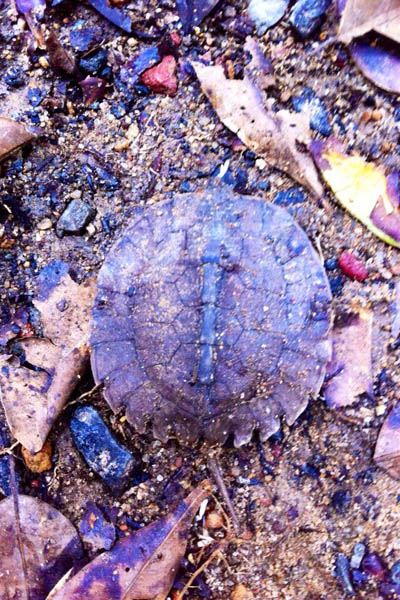
Image Copyright Nattapol Phutong
Last Observed: January 2016, Koh Chang
Observed By: Nattapol Phutong
The Asian leaf turtle is a Southeast Asian native species of turtle that is very common in the pet trade. It grows up to a maximum of 24cm in length.
Nature has some interesting defense mchanisms but the Asian leaf turtle’s is a strange one. When threatened it can squirt the contents of its digestive system. Puking on predators! Once again nature excels itself.
Asian Leaf Turtle Wikipedia
Blanford’s Bridle Snake (Dryocalamus davisonii)
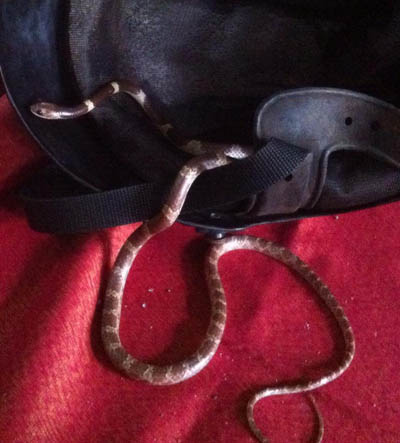
Image Copyright Heli pohjolainen
Last Observed: March 2016
Observed By: Heli Pohjolainen
Blanford’s Bridle Snake (a.k.a. the Indian Wolf Snake) is a small, non-venomous colubrid snake species that is endemic to Asia.
It is called a bridle snake due to it’s supposed resemblance to a horse’s bridle. You have to wonder if Davison, or Blanford, or whoever it was that named it had been in the jungle too long when they made that comparison.
Blanford’s Bridle Snake Wikipedia
Common Mock Viper (Psammodynastes pulverulentus)
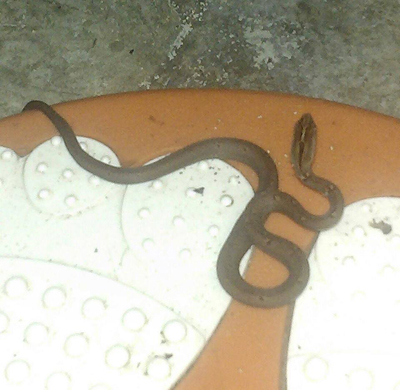
Image Copyright Napha Kotkangplu
Last Observed: December 2015
Observed By: Napha Kotkangplu
The Common Mock Viper is a small species of snake that grows up to 65 cm in length. It is native to Asia.
Perhaps the most startling fact about this species is that the male posesses three penises. Really. You’d think that this would be a problem for a snake but the specially evolved hemipenis can be retracted when not in use. Only one of the three hemipenes is used at a time and they commonly have barbs or hooks. It is truly a strange and amazing world.
As its name suggests the mock viper resembles a viper but does not come from the same family. It is rear fanged and possesses a very mild venom that isn’t harmful to humans.
Common Mock Viper Wikipedia
Mock Viper Thailandsnakes.com
Asian Water Dragon (Physignathus cocincinus)
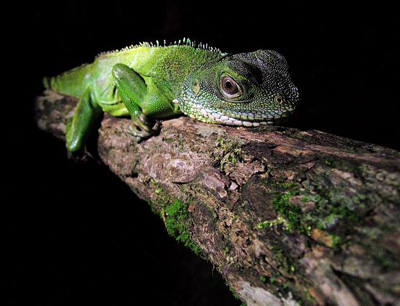
Image Copyright สุธนัย ครุพานิช
Last Observed: December 2015
Observed By: สุธนัย ครุพานิช, Parinya Pawangkhanant
What a brilliant picture this is of the splendid Asian water dragon. This mighty lizard can grow up to 1 metre in length and live for up to fifteen years.
These lizards are most commonly found along the banks of freshwater streams and are mainly tree-dwelling (arboreal) living and active mainly in the daytime (diurnal).
Asian Water Dragon Wikipedia
Image Copyright Parinya Pawangkhanant
Image Copyright สุธนัย ครุพานิช
Image Copyright สุธนัย ครุพานิช
Kukri Snake (G. Oligodon)
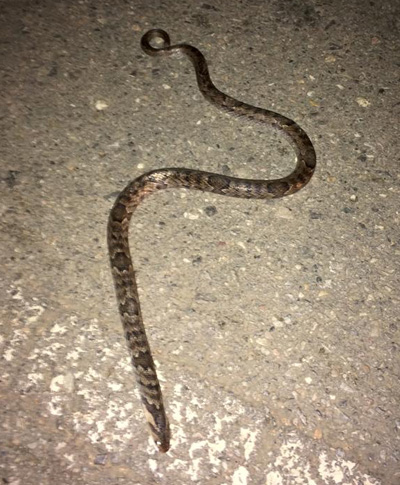
Image Copyright Hans-Henrik Hansen
Last Observed: December 2015
Observed By: Hans Henrik Hansen
Kukri Snakes or Oligodon are a genus of snakes that comprise 75 species. And this is one of them. They live mainly by stealing the eggs of birds and reptiles and typically are less than 1.5 metres in length.
They are not venomous or considered dangerous to hymans. They have large teeth at the back of their throats that are specially adapted to slicing open aggs as they are being swallowed and thereby speeding up digestion.
Oligodon Wikipedia
Cardamom Forest Gecko (Cyrtodactylus intermedius)
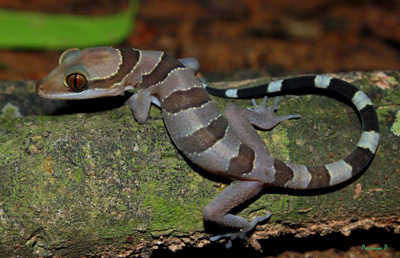
Image Copyright Parinya Pawangkhanant
Last Observed: December 2015, Koh Chang
Observed By: Parinya Pawangkhanant
The Cardamom Forest Gecko, or intermediate bow-fingered gecko, is a species of Gecko found only in parts of Thailand, Cambodia and Vietnam. It is a forest-dwelling Gecko that is quite at home in Koh Chang’s lush rainforest.
Cardamon forest Gecko Leaf Turtle Wikipedia
Western Black-Bridged Leaf Turtle (Cyclemis atripons)
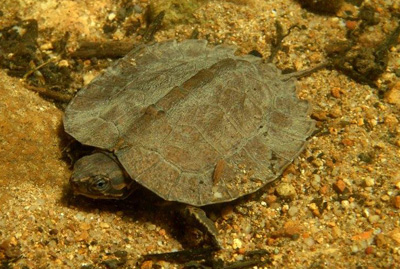
Image Copyright Parinya Pawangkhanant
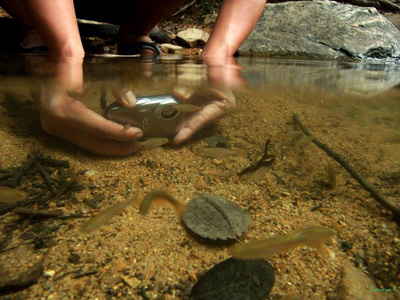
Image Copyright Parinya Pawangkhanant
Last Observed: December 2015, Koh Chang
Observed By: Parinya Pawangkhanant
The name of this tiny freshwater turtle is probably longer than the animal itself. The species is native to Cambodia, Southeast Thailand and Vietnam.
It is apparently nearly indistinguishable from the Eastern Black-Bridged Leaf Turtle.
Western Black-Bridged Leaf Turtle Wikipedia
Checkered Keelback (Xenochrophis piscator)
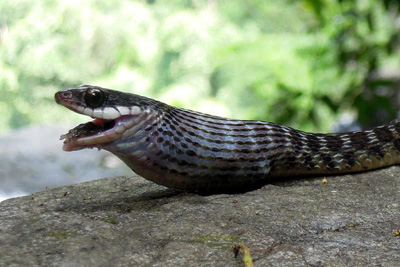
Image Copyright Parinya Pawangkhanant
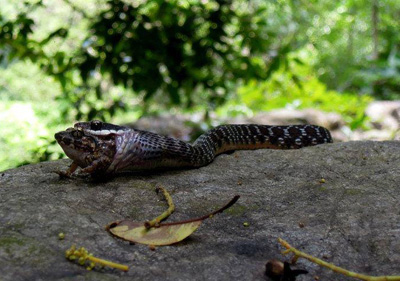
Image Copyright Parinya Pawangkhanant
Last Observed: December 2015, Koh Chang
Observed By: Parinya Pawangkhanant
This checkered keelback is giving an excellent demonstration of how snakes can dislocate their jaws to swallow very large meals – a handy skill.
This species is a large nonvenomous snake that is also known as the Asiatic Water Snake.
Checkered Keelback Wikipedia
Acanthosaura Cardomomensis
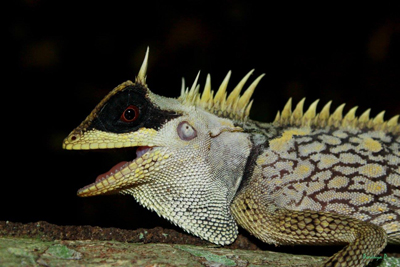
Image Copyright Parinya Pawangkhanant
Last Observed: December 2015, Koh Chang
Observed By: Parinya Pawangkhanant
This fierce looking lizard sports a black mask-like marking around its eyes as well as a crest of yellow spines down its neck and back and intricately patterned scale markings.
It is apparently a very local species to Koh Chang being found only in Eastern Thailand and the Cardamom Mountains of Western Cambodia (hence the name Cardomomensis). It is also a relatively newly discovered species and we’re certainly lucky to have it as a fellow Koh Chang resident.
Acanthosaura Cardomomensis Wikipedia
Image Copyright Parinya Pawangkhanant
Oriental Whip Snake (Aheatulla prasina)
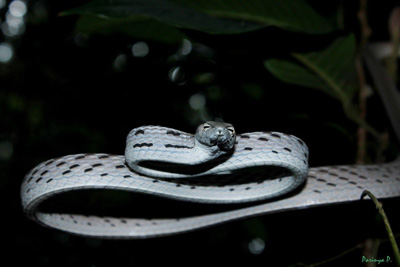 Last Observed: December 2015
Last Observed: December 2015
Observed By: Parinya Pawangkhanant
The Oriental Whip Snake is presumably named for the tightly coiled posture it adopts. Its colour can vary from light brown to dark green.
Wikipedia tells us that they can reach 1.8 metres in length with a tail of 60cm. Hang on – snakes have tails? Where does the tail end and the snake begin? (Pause)
OK I know all about snake tails now. Read here for an excellent explanation. Basically it’s the bit after the snakes ribs stop. Fascinating.
This snake feeds on small reptiles and amphibians.
But you want to know if it’s poisonous or not don’t you? The answer is yes – but only mildly – and they aren’t considered to be a threat to people, in fact they are apparently popular pets.
Oriental Whip Snake Wikipedia





